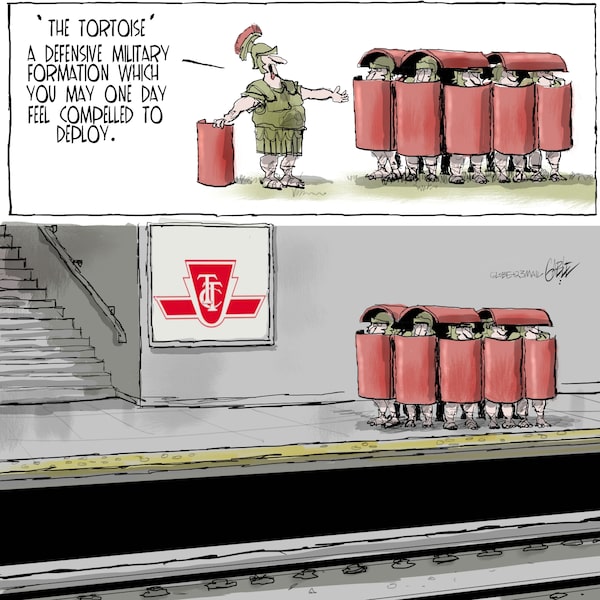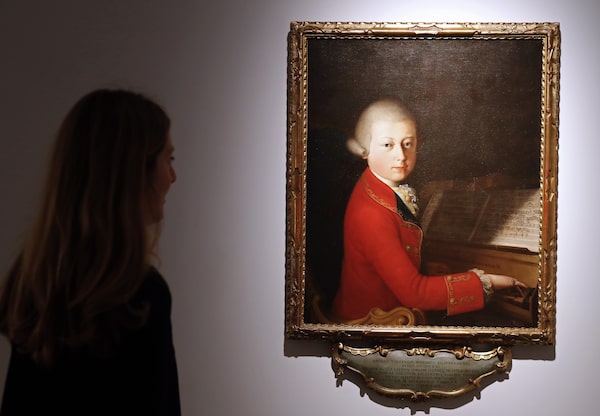Good morning,
Canada Revenue Agency Commissioner Bob Hamilton says it is not worth the effort to conduct a full review of more than $15-billion in pandemic wage benefits the Auditor-General has said may have been sent to ineligible recipients.
Hamilton said during a committee appearance Thursday that the agency stands by its existing “risk-based” approach to enforcement, in which it reviews a sample of cases it deems most likely to be of concern. Karen Hogan, meanwhile, told the committee that a more aggressive and expansive review is warranted, given the very limited safeguards that were in place to screen applications during the pandemic.
Read more:
- As demand for COVID-19 shots wanes, underserved communities face multiple barriers again
- Blood donations suggest 73 per cent of Canadians have had COVID-19
This is the daily Morning Update newsletter. If you’re reading this on the web, or it was forwarded to you from someone else, you can sign up for Morning Update and more than 20 other Globe newsletters on our newsletter signup page.
What the convoys left behind
Wellington Street in Ottawa, as it looked on Jan. 28, 2022 – the first week of last year’s convoy protests.Justin Tang/The Canadian Press
Virtually all traces of the convoy protest that choked the streets of Ottawa a year ago have vanished. But the main drag of Wellington in front of Parliament Hill still hovers in a state of tentative abandonment, writes Shannon Proudfoot. For now, with the city and the federal government tussling over Wellington’s long-term future, haphazardly placed concrete barriers remain to keep traffic at bay.
What ensued a year ago was a protest so large and intractable that it surprised even its most enthusiastic participants, many of whom have come to view it as a transformative life experience. Three weeks after the protest started, the government shut it down with the unprecedented invocation of the Emergencies Act.
Next month, a public inquiry will issue a final report on whether that call was justified. This will help to answer what happened then, but what remains now of the convoy and the political, social and economic currents that fed it are what everyone has to live with.
• The photos that defined the convoy protests of 2022
Toronto police to boost TTC presence after spate of violent incidents
Toronto police said Thursday the force will beef up their presence immediately on the city’s transit system after a spate of violent incidents that have rattled public confidence.
Police Chief Myron Demkiw said as many as 80 more officers would be patrolling the Toronto Transit Commission daily. Demkiw, joined by Toronto Mayor John Tory and TTC CEO Rick Leary at the announcement, said the additional patrols would be done primarily by off-duty officers earning overtime, to leave the regular force available for other duties.
- Gary Mason: Random acts of violence? Better get used to it
- Tips to stay safe on Toronto’s transit system in light of recent violence
Got a news tip that you’d like us to look into? E-mail us at tips@globeandmail.com Need to share documents securely? Reach out via SecureDrop
Also on our radar
Canada donates four Leopard battle tanks to Kyiv: Ottawa’s latest contribution to Ukraine’s war effort amounts to less than 5 per cent of its inventory of these tanks, with experts saying that reflects the relatively small capacity of Canadian Armed Forces today.
Two-thirds of research-grant requests sent to Canadian security agencies rejected: Thirty-two applications sent for assessment to safeguard intellectual property from authoritarian governments were deemed to pose an unacceptable risk and denied funding.
Fewer apartments available to rent in Canada: The national vacancy rate dropped to 1.9 per cent in 2021, the lowest level in more than two decades as the country took in a record number of newcomers and many residents were priced out of the real estate market.
Teaching kids about the Holocaust earlier can help combat antisemitism, educators say: The Ontario government announced recently that Holocaust learning will be a mandatory part of the Grade 6 social studies curriculum, starting in the fall. Currently, the Holocaust and other genocidal acts are required to be introduced in a Grade 10 history course.
Morning markets
Global markets take a breather: World stocks eked out a 5-1/2 month high and the U.S. dollar held close to an eight-month low on Friday, as reassuring U.S. economic and inflation data kept the bulls largely in charge ahead of next week’s slate of top central bank meetings. Around 5:30 a.m. ET, Britain’s FTSE 100 was up 0.08 per cent. Germany’s DAX and France’s CAC 40 rose 0.07 per cent and 0.10 per cent, respectively. In Asia, Japan’s Nikkei added 0.07 per cent. Hong Kong’s Hang Seng rose 0.54 per cent. New York futures were in the red. The Canadian dollar was higher at 75.11 US cents.
What everyone’s talking about
Florida’s book ban takes censorship to the next level
“... If it’s sex these censorious anti-intellectuals are worried about, they may want to have a seat while we break the news to them: Kids don’t need to learn this stuff from banned-book queen Judy Blume, or from Robie Harris’s It’s Perfectly Normal: Changing Bodies, Growing Up, Sex and Sexual Health, another frequently censored volume. They can learn it from the internet, from sources far less trustworthy and much more graphic.” - Marsha Lederman
Too many tip prompts? Blame business owners and unfair wages
“We’re being asked to tip everyone, everywhere, all the time and in ever-increasing amounts. In the early months of the COVID-19 pandemic, customers tipped lavishly when efforts to save local restaurants during lockdowns became a civic duty among those who could afford regular takeout. Though the social pressures that fuelled that boom faded, there has been a hangover....” - Corey Mintz
Today’s editorial cartoon

Brian Gable/The Globe and Mail
Living better
Five things to stream this weekend: Jennifer Lopez has a Shotgun Wedding, plus Kevin Costner rides again
From Jennifer Lopez’s highly watchable Shotgun Wedding, a rom-com fit for a lazy Saturday night at home, to the drama Armageddon Time, starring Anne Hathaway and Jeremy Strong, here are Barry Hertz’s weekend picks.
Moment in time: Jan. 27, 1756
Wolfgang Amadeus Mozart is born

A woman looks at a painting showing a portrait of a 13-year-old Wolfgang Amadeus Mozart, dated from 1770.FRANCOIS GUILLOT/AFP/Getty Images
It’s a cliché to say a person was “born to do” a thing that brought them fame and success, but what else can you say about someone who was writing minuets at an age when most of us are still struggling to write our own names? Wolfgang Amadeus Mozart’s father, Leopold, was a musician and music instructor. Within a few years of Wolfgang’s birth in the city of Salzburg, the youngster was picking up the basics of musical composition by watching his father give keyboard lessons to his older sister. Within a few years after that, he had composed the first works in what would become a huge and historic catalogue of music in almost every style popular during the Classical period. Mozart’s melodic brilliance was recognized in his day, and he is now considered one of the greatest composers to have lived, a singular talent who brought new sophistication to every musical form he touched. Despite his evident gifts, Mozart led a peripatetic life, moving around Europe in search of steady aristocratic patronage that never quite materialized. He died in 1791 of unknown causes, a 35-year-old man with hundreds of compositions to his name and a few more still unfinished. Steve Kupferman
Read today's horoscopes. Enjoy today's puzzles.
If you’d like to receive this newsletter by e-mail every weekday morning, go here to sign up. If you have any feedback, send us a note.